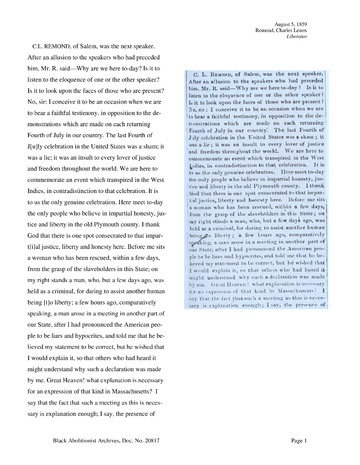
Speaker or author: Remond, Charles Lenox, 1810-1873
Newspaper or publication: Liberator
Impassioned speech defending the speaker's assertion that the U.S. government is composed of "liars and hypocrites" who dare to celebrate the July 4th freedom of a nation which continues to hold millions of enslaved people.
Description of file(s): PDF 3 page, 806 word document (text and images)
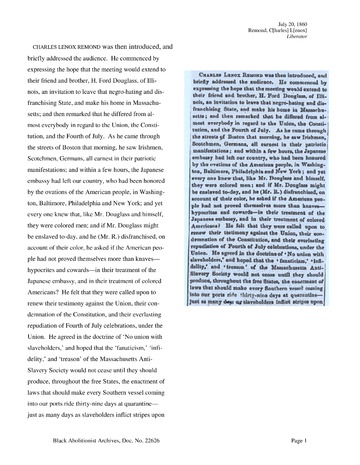
Speaker or author: Remond, Charles Lenox, 1810-1873
Newspaper or publication: Liberator
Overview of a speech encouraging H. Ford Douglass to make his home in Massachusetts where there was more racial diversity. The speaker expressed his agreement with the doctrine that said "No Union with Slaveholders."
Description of file(s): PDF 2 page, 311 word document (text and images)
(page1).jpg.jpg)
Title: Colored American - July 13, 1839
Speaker or author: editor
Newspaper or publication: Colored American (1837 - 1842)
The writer described the visit to that city of Martin Van Buren and contrasted the event with the past visits by John Quincy Adams. He felt ashamed of the pomp and circumstance surrounding the day. He also described the revelry and celebration of July 4th with similar criticism.
Description of file(s): one scanned, two columned, newspaper page
(page1).jpg.jpg)
Title: Elevator - July 21, 1865
Speaker or author: editor
Newspaper or publication: Elevator (1865 - 18??)
The editor lists the names of African American butchers who were not afraid to participate in the July 4th parade even though there was opposition to their presence from other groups. He includes brief advertising for establishments that also participated.
Description of file(s): one scanned, two columned, newspaper page
(page1).jpg.jpg)
Speaker or author: editor
Newspaper or publication: Elevator (1865 - 18??)
The writer gives a brief overview of the events celebrating the Fourth of July in that city. He notes the assemblies of marching societies that honored African American marchers. He also points out that the Italian fishermen were the exception to this and refused to march next to African Americans.
Description of file(s): one scanned, two columned, newspaper page
(page1).jpg.jpg)
Speaker or author: editor
Newspaper or publication: Elevator (1865 - 18??)
The writer shares a card declining an invitation given to African Americans in Placerville to march in the July 4th parade. The card was signed by "Colored Citizens," and details the reasons for this action. He emphasizes that this was unnecessary since those whose racial prejudice had motivated this step were not worthy of this much regard.
Description of file(s): one scanned newspaper column
(page1).jpg.jpg)
Title: Elevator - June 30, 1865
Speaker or author: editor
Newspaper or publication: Elevator (1865 - 18??)
The writer encourages his readers to celebrate this Fourth of July as free people and American citizens.
Description of file(s): one scanned, two columned, newspaper page
(page1).jpg.jpg)
Speaker or author: editor
Newspaper or publication: Elevator (1865 - 18??)
The writer shares with his readers a clip from a prejudicial newspaper indicating that there were many people opposed to allowing African Americans to join public celebrations of the Fourth of July.
Description of file(s): one scanned newspaper page
(page1).jpg.jpg)
Title: Frederick Douglass' Paper - July 6, 1854
Speaker or author: Watkins, William J.
Newspaper or publication: Frederick Douglass' Paper (1851 - 18??)
The writer ironically describes Independence Day (July 4th) as a day we celebrate the mockery of freedom and justice in the U.S., a country still renowned for its cruelty, injustice and continued enslavement of a large portion of its population.
Description of file(s): one scanned, two columned, newspaper page
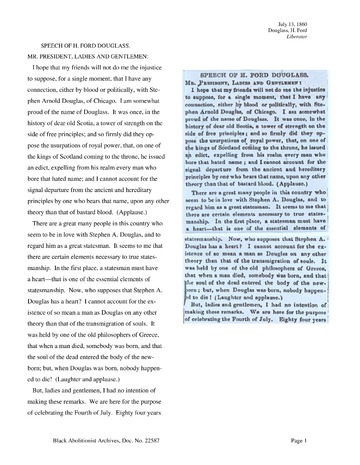
Speaker or author: Douglass, H. Ford
Newspaper or publication: Liberator
Speaking in favor of the Stephen A. Douglas candidacy, the speaker emphasized the pro-slavery position of Abraham Lincoln. He noted that even though the Republican party (to which Lincoln belong) was considered the "anti-slavery party," Lincolns actions showed a different perspective. He noted that Lincoln supported the Fugitive Slave Law and expressed that Lincoln was pro-slavery.
Description of file(s): PDF 23 page, 6,716 word document (text and images)
(page1).jpg.jpg)
Title: Pacific Appeal - July 4, 1863
Speaker or author: editor
Newspaper or publication: Pacific Appeal (1862 - 188?)
The writer reflects on the years since the signing of the Declaration of Independence. He includes an excerpt from the Scholar's Manual which provides insight into the drafting of this important document. He notes that African American men fought in 1776 to secure the freedom this document represents, but it's only now that they can truly celebrate their own freedom.
Description of file(s): one scanned, two columned, newspaper page
(page1).jpg.jpg)
Speaker or author: editor
Newspaper or publication: Pacific Appeal (1862 - 188?)
Brief note telling readers that the Fourth of July was celebrated with much enthusiasm despite the Civil War.
Description of file(s): one scanned newspaper column
(page1).jpg.jpg)
Title: Pacific Appeal - June 13, 1863
Speaker or author: editor
Newspaper or publication: Pacific Appeal (1863 - 188?)
The writer comments on the exchange talking place in California newspapers regarding the question of whether African Americans should be allowed to celebrate the Fourth of July. He includes a list of suggested activities to commemorate the day.
Description of file(s): one scanned, two columned, newspaper page
(page1).jpg.jpg)
Title: Pacific Appeal - June 27, 1863
Speaker or author: editor
Newspaper or publication: Pacific Appeal (1862 - 188?)
Within the short period of time since the Emancipation Proclamation, the country has altered its national focus from an attitude of pro-slavery to an extreme anti-slavery stance. This Independence Day, the African American population will celebrate their own freedom along with the rest of the country.
Description of file(s): one scanned newspaper column
(page1).jpg.jpg)
Title: Pacific Appeal - May 2, 1863
Speaker or author: editor
Newspaper or publication: Pacific Appeal (1862 - 188?)
The writer addresses the question of whether African Americans should celebrate the July 4th holiday since it doesn't really mark their freedom like it does for white Americans. He suggests that from now on the celebration of the emancipation of the British West Indies (usually celebrated on August 1st) be celebrated on July 4th. This way, the Fourth of July could truly be a national holiday giving all Americans a way to celebrate freedom.
Description of file(s): one scanned, two columned, newspaper page
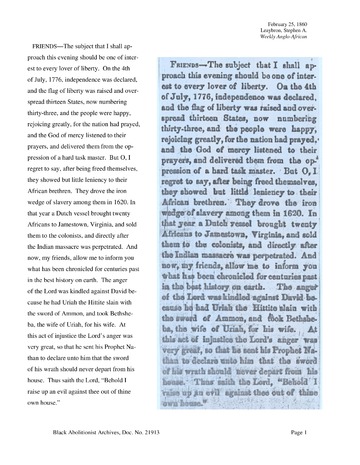
Newspaper or publication: Weekly Anglo-African (1859 - 1862)
Speech addressing a brief history of slavery in the U.S., and stressing the irony of continued slavery in a country founded on freedom and liberty.
Description of file(s): PDF 3 page, 720 word document (text and images)
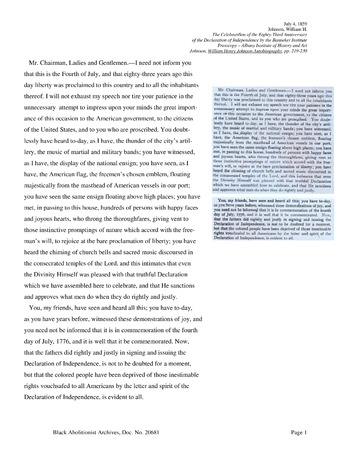
Speaker or author: Johnson, William Henry, 1833-1918.
Newspaper or publication: Presscopy -- Albany Institute of History and Art
The speaker traced the history of freedom in the U.S. during a July 4th celebration in Philadelphia. He emphasized the irony of continued slavery in a country founded on freedom and liberty for all.
Description of file(s): PDF 15 page, 5,184 word document (text and images)

Speaker or author: Brown, William Wells, 1814?-1884
Newspaper or publication: Liberator
The speaker expresses his concern that the promises made by Abraham Lincoln and the freeing of the slaves would not be realized. He urges the abolitionists to continue fighting for freedom and suffrage. (Includes MP3 audio file.)
Description of file(s): PDF 2 page, 580 word document (text and images)



